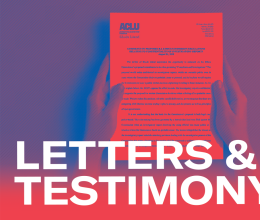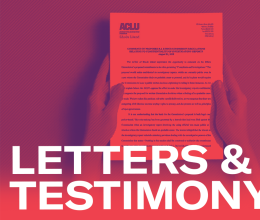The ACLU of Rhode Island has today filed a federal lawsuit on behalf of the community advocacy group ACORN (Association of Community Organizations for Reform Now), challenging an East Greenwich Town Council ordinance barring the group from engaging in political door-to-door canvassing between 7 and 9 PM, and requiring payment of a permit fee for the group’s canvassing activities. The lawsuit, filed by ACLU volunteer attorney Carolyn Mannis, argues that the restrictions violate ACORN’s First Amendment rights.
The lawsuit notes that political canvassing is a “vital part” of the organization’s program, and is an effective way for ACORN to disseminate information about its activities, obtain signatures on petitions and solicit donations to fund its work. The hours of 4 to 9 PM are the organization’s standard canvassing hours in every community, and the canvassers find that they achieve the best response between 6 and 9 PM. The ordinance also requires applicants to obtain a permit at least five days prior to the time when they wish to canvass. In papers filed with the suit, the ACLU points to numerous court cases that have struck down these types of restrictions on non-profit canvassing. The suit notes that ACORN has engaged in canvassing throughout Rhode Island for six years without incident. The suit argues that the Town’s ordinances are “not narrowly tailored to meet a substantial or compelling governmental interest,” and that less restrictive means are available to regulate canvassing activities in the town.
The suit seeks a temporary restraining order against continued enforcement of the challenged restrictions, as well as compensatory damages for the group’s lost income.
The ACLU’s Mannis said today: “Only a year ago, the ACLU favorably settled a lawsuit against the Town of Johnston, which also banned political canvassing after 7 PM. We are confident that when the court examines the restrictions imposed by the Town of East Greenwich, it will agree that they also unconstitutionally restrict ACORN’s First Amendment rights.” The Johnston case was filed on behalf of another grassroots organization, Clean Water Action. A hearing on the ACLU’s request is expected in a few days.






